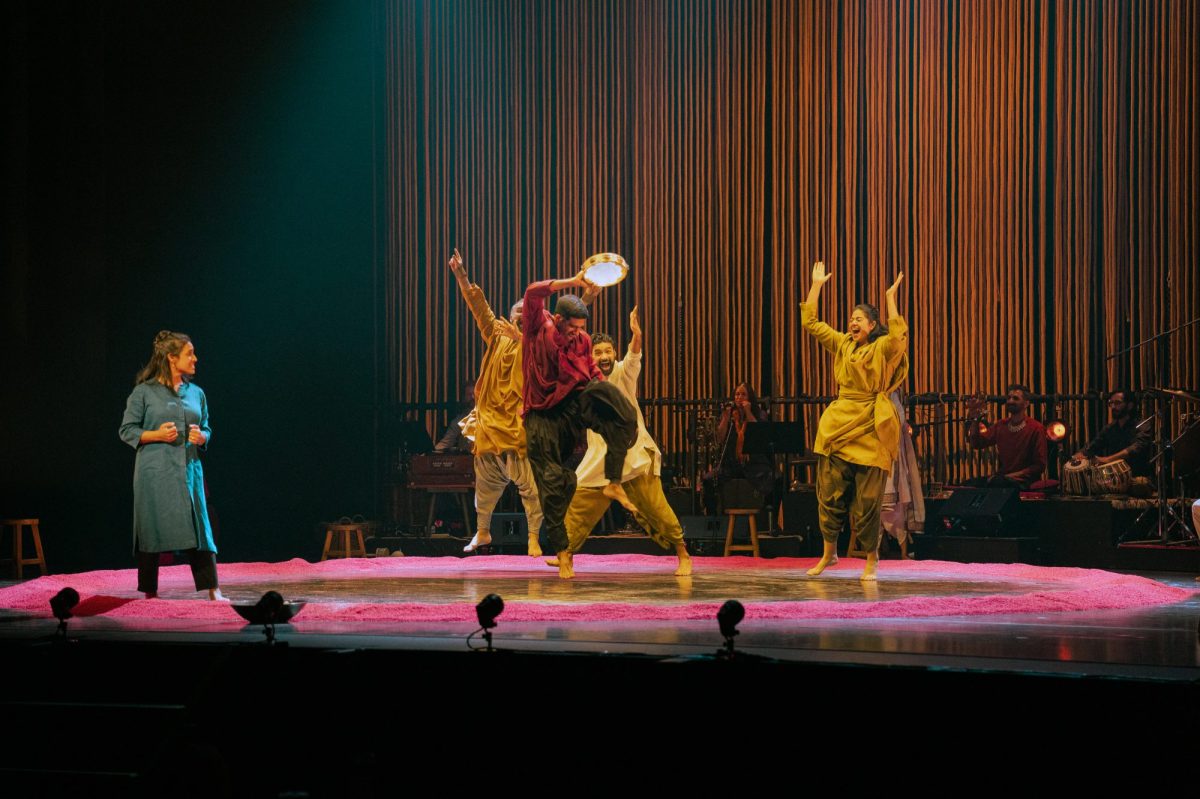Why Not Theatre’s Mahabharata महाभारतम्, co-created by Miriam Fernandes and Ravi Jain, is a two-part dramatisation of one of the two most important epics in classical Indian literature. This is a Canadian production that was originally commissioned and presented by the Shaw Festival in association with the Barbican Centre in London.
At its core, it tells the story of a war of succession between two parts of a dynasty but, as insightfully elucidated at a community meal and storytelling session hosted alongside the performance, it offers much more than that – it is a compendium of meditations on humanity, ethics, duty, justice, righteousness, conflict and more.
Much like the narrative weavers and storytellers of tradition, Fernandes and Jain have crafted a fine tapestry of the core narratives of the Mahabharata. They have rendered the epic faithfully, strategically depicting its most salient events and distilling its more significant themes and philosophical contributions.
In part one (Karma), we learn about a kingdom and family riven by factionalism, envy and injustice. In part two (Dharma), we watch the Pandava and Kaurava clans battle for supremacy. Enmity, duty and destiny lead the characters towards inevitable conflict, raising profound ethical dilemmas around whether and how (and how long) to fight for the restoration of a just order.
In an acknowledgement of the contemporary significance of the epic’s meditations on the perils of war, the play concludes with a moving meditation on the devastating aftermath of conflict, the mental and emotional anguish that comes with a pyrrhic victory, and the painful legacy of man’s desire for vengeance.
Lorenzo Savoini’s set design goes from structurally minimalist in the first part to opulent and spectacular in the second, both to astounding effect. Mirrors, chandeliers and screens (with projections) strategically enhance the illusory quality of the scene. Similarly, sleek and highly symbolic props and stage contours, and spare but elegant and astutely designed costumes give the production a thrillingly and refreshingly contemporary feel.
The clever lighting design and videography create a powerful visual template for the complex unfolding of different strands of the narrative, from the celestial to the earthly, from visions of divine revelation to visions of human and superhuman belligerents engulfed in battle.
Unencumbered by gender, the casting is superb and completely transforms the experience of watching the distinctive characters, well-known and widely-recognised as cultural archetypes, come to life. There is humour and chutzpah in the dramatisation, and the poetic dialogue is delivered beautifully. Classical and contemporary choreography breaks up the action, while an orchestra performs invigorating live music to accompany the narrative in part one.
The Bhagavad Gita opera in part two, composed by John Gzowski and Suba Sankaran and performed by Meher Pavri, is undoubtedly the musical high-water mark of the show. The impeccable and stylistically eclectic composition and powerful performance befittingly elevate the transformative moment of the god Krishna’s revelation of the divine truth to Arjuna and his exposition of the key concepts of dharma and devotion. With the music, videography, and stage and costume design, the show turns this pivotal part of the epic into a sublime musical and visual feat.
Read: Album review: Hurry Up Tomorrow, The Weeknd
There is an undeniable transcendental quality to this epic production, a spiritual significance and resonance that cannot be gainsaid. The fact that this production carries this formidable mantle so nimbly and with such vitality and effervescence, while entertaining and enthralling audiences with its evocative dialogue and narrative style, dynamic casting and acting, vivid stage design and videography, and rousing blend of classical and contemporary music and choreography, is a testament to the creative rigour and genius of its creators and performers.
Mahabharata
A Why Not Theatre Production
His Majesty’s Theatre, Perth
Written and created by Miriam Fernandes and Ravi Jain, using poetry from Carole Satyamurti’s Mahabharata: A Modern Retelling
Original concept developed with Jenny Koons
Originally commissioned and presented by the Shaw Festival in association with Barbican, London
Director, Writer and Creator: Ravi Jain
Associate Director, Writer and Creator: Miriam Fernandes
Set Designer: Lorenzo Savoini
Costume Designer: Gillian Gallow
Lighting Designer: Kevin Lamotte
Associate Lighting Designer: Mikael Kangas
Projection Designer: Hana S Kim
Associate Projection Designer: Ann Slote
Original Music and Sound Designer: John Gzowski and Suba Sankaran
Traditional Music Consultant: Hasheel Lodhia
Choreographer: Brandy Leary, with contributions from Jay Emmanuel and Ellora Patnaik
Kathakali choreography for Jay Emmanuel: Kalamandalam Thulasi Kumar (choreography), Kalamandalam Adhityan (Chenda), Kalamandalam Roopesh (Maddalam), Kalamandalam Abhijit Pillai (Thalam)
Creative Associate, Khana and Kahani storyteller: Sharada K Eswar
Lead Producer: Kevin Matthew Wong
Lead Production Manager: Crystal Lee
Bhagavad Gita Opera
Written and adapted by Miriam Fernandes and Ravi Jain
Original music and score by John Gzowski and Suba Sankaran
Translation and text adaptation by Sharada K Eswar
Performed by Meher Pavri, with guest recording artist Trichy Sankaran (mrdangam)
Musicians: John Gzowski , Suba Sankaran, Dylan Bell, Gurtej Singh Hunjan, Hasheel Lodhia, Zaheer-Abbas Janmohamed
Community consultant and industry partner: Encounter Theatre
Community advisory committee: Mala Dharmananda, Sreekanth Gopalakrishnan, Yaso Ponnuthurai, Balli Singh, Kamal Thurairajah
Foyer Designer: India Mehta
Stage Manager: Neha Ross
Assistant Stage Manager: Victoria Wang and Jenny Kim
Technical Director: Daniel Bennett
Head of Video and Video Op: Danny Carr
Video Engineer: Matthew Mellinger
Head of Sound: Brandon Wells
Head of Wardrobe: Chanti Laliberte
Production Finance: Sarah Newkirk
Production Marketing: Mary Anderson
Cast: Shawn Ahmed, Neil D’Souza, Jay Emmanuel, Miriam Fernandes, Ravin J Ganatra, Karthik Kadam, Darren Kuppan, Anaka Maharaj-Sandhu, Goldy Notay, Ellora Patnaik, Meher Pavri, Sakuntala Ramanee, Ronica Sajnani, Ishan Sandhu, Navtej Sandhu, Munish Sharma, Sukania Venugopal
Mahabharata will be performed until 16 February 2025 as part of Perth Festival.
